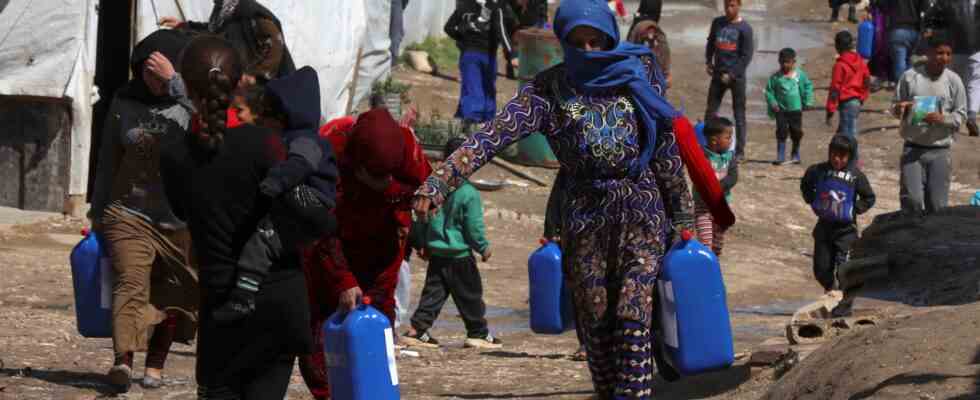Status: 06/20/2022 04:58 a.m
Compared to the number of inhabitants, Lebanon has taken in the most refugees in the world – also from Syria. Because of the economic crisis, children often have to rummage through the rubbish to ensure the family’s livelihood.
In fact, you hardly see them. A huge garbage bag full of plastic bottles moves under a motorway bridge on the outskirts of Lebanon’s capital Beirut. Two thin legs peek out from underneath. Salladin collected eagerly. Everything that people throw away.
He’s been searching the capital’s dumpsters all morning. “I’ll sell that. I get some money per kilo,” he says. He earns 40,000 lira a day, he says proudly. His little brother honestly corrects: No, it’s 20, 30,000 sometimes 40 on particularly good days. Or 50.”
50,000 lira, the top salary – that would be less than two euros a day. They look very serious when Beirut’s garbage children talk about market prices, almost grown-up features in their small dirty faces. They are ten and eleven years old – and refugees from Syria.
1.5 million refugees – with six million inhabitants
A few dozen kilometers further, towards the Syrian border – in the Bekaa Valley: this is where most of the Syrian refugees live. Lebanon has taken in 1.5 million Syrians in recent years, and these are just the official figures. The number of unreported cases is likely to be much higher – and that in a country with just around six million inhabitants. Measured by its population density, Lebanon has taken in the most refugees in the world.
Zainab is up to his ankles in garbage. Here the children sort what they have collected. Plastic, cardboard and other rubbish pile up behind the poor camp of improvised tents and huts.
“I’m responsible for the plastic bags. I collect them everywhere, then we pack them in bags and sell them to recycling companies. I get 3,000 or 4,000 lira per kilo. We use this to buy food to satisfy our hunger,” she says.
Economic crisis worsens the situation
How long does she have to collect to collect a kilo of plastic bags? Zainab shrugs. She gets the equivalent of less than 20 cents for it. Zainab’s father is actually a sheikh, a respected tribal leader in Syria. Now Sheikh Zakaria has to watch as his family rummages through the garbage and goes hungry: “I’m the clan elder, I’m a sheikh. I’m ashamed to say that we live off the garbage, but that’s how it is,” he says. “We are very affected by the economic crisis in Lebanon. Normally I buy five packages of bread for the family, we are 13 people. Today I can’t even afford two packages, that’s less than a small flatbread for each one. I only eat once a day.”
The current economic crisis in Lebanon has made the situation for the Syrian refugees even worse. According to the UN, nine out of ten Syrians live in abject poverty, and almost 90 percent of all refugees are dependent on UN aid. The problem: for several years, the Syrians have received their support in Lebanese lira instead of dollars. But inflation is rampant in Lebanon, and the currency has lost around 90 percent of its value.
“It’s not enough”
Food prices have risen by more than 600 percent. According to Zakaria, per capita aid from the UN is no longer enough for the bare essentials. “It’s not enough. The aid isn’t even enough for oil or a sack of sugar. We cook with gas – and a gas bottle alone costs 500,000 – and then it’s the beginning of the month and we haven’t eaten anything yet. We live in a tent, but we have to Pay rent for the place, 350,000. Electricity costs 500,000. The money is not enough in front and behind. What should I do? Actually, I can only kill myself because I can no longer help my children.”
His son Salem is just coming home. The twelve-year-old doesn’t go to school, but works for farmers in the fields: picking up potatoes and carrying sacks – much too hard work for the slight boy.
“It’s very difficult to carry the sacks. A sack weighs about 60 kilos,” he says. “Sometimes I can do it, sometimes not. I only weigh 40 kilos myself. My legs hurt after work.”
Salem earns the equivalent of a dollar a day for the backbreaking work. According to UN figures, at least a third of Syrian children in Lebanon have never attended school, and 28,000 children have to work regularly.
Too hot in summer, too humid in winter
Salem and his siblings only know Syria from stories, they have been living in Lebanon for so long. The refugee camp has become their home – even if they don’t like it: “In the summer it’s hell,” says eleven-year-old Shad. “We all sleep in one room. We try to cool the rooms. The room has no window and our fan is broken.”
Mother Khadischeh, on the other hand, prefers summer: “We can endure the heat, but winter with rain and snow is a bigger problem. When it snows, we can’t sleep. The tent roof collapses. We spend the whole night digging out the water and Removing the snow from the tent roof, otherwise it will collapse.”
They would like to go back to Syria, the parents affirm. But everyone here is afraid of the Assad regime. The sons would have to join the army. And as refugees, the families would be seen as traitors. Her village is now under regime control, her house destroyed.
A little girl trudges through the camp on shaky legs – she has just learned to walk. The little one’s name is Watan, says her mother, and she smiles sadly: “So that Syria is at least a little with us.” Watan means translated: homeland.
The Garbage Children of Beirut – Syrian Refugees in Lebanon
Anna Osius, ARD Cairo, 19.6.2022 11:58 p.m

